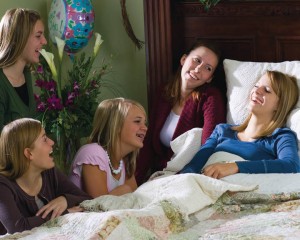My husband is 12 years older than I am, and most of our friends are older than both of us. In recent years, we’ve watched our friends become ill and their spouses struggle to care for them. It is not easy. As a matter of fact, in some cases it is probably the most challenging time of their entire marriage. We help when we can, but it is never enough for the responsibility that is poured on the spouse.
 We got a small taste of what it’s like a couple of years ago when I fell down a flight of stairs at work and broke both ankles. While recuperating, I had pancreatitis and my gallbladder removed. We learned a lot about ourselves and each other during those few months. Next time we will be better prepared.
We got a small taste of what it’s like a couple of years ago when I fell down a flight of stairs at work and broke both ankles. While recuperating, I had pancreatitis and my gallbladder removed. We learned a lot about ourselves and each other during those few months. Next time we will be better prepared.
Some of our friends have dealt with this better than others. Some have grown closer during times of illness and even the process of death. Others have bickered and become bitter. The stress that is put upon a marriage during times of illness is almost unimaginable. We go into marriage promising to stay beside our partner “in sickness and in health,” but none of us really has a clue what that means. Sometimes standing by someone means bringing in outside help, or even removing them from the home and putting them where they can get better care than we are capable of giving them. There is guilt and grief that goes along with that process.
I’ve learned from observing our friends that attitude has a lot to do with how one copes as a caregiver, as well as how a patient deals with an illness. There is a choice to be made, and it is the same for the caregiver as the patient: a) Am I going to cry “Why me?” or b) Am I going to look for the positive in each new day? The positive may be illusive on some days, but if we look, it’s there somewhere.
It’s important for the caregiver to have personal time to regroup. If the caregiver doesn’t take care of herself/himself, there is great risk of the caregiver becoming ill. According to Kaiser Health News (collaborating with The Washington Post), caregivers are at risk of emotional stress and depression, which in turn gives them a higher risk factor for heart disease, diabetes, cancer and even arthritis. When the body is under emotional stress, the immune system is weakened. (Kaiser Health News, Span, Paula, Spouses Face Hurdles When Caring for Themselves, Ill Loved Ones,)
“Caregivers who provide support to their spouse and are under stress are more than twice as likely to die within four years than spouses who are not serving as caregivers. Researchers say the findings indicate that both spouses need treatment and support at the same time. The study was published in the December issue of the Journal of the American Medical Association.” (WebMD, Schwanke, Jane, Caring for Elderly Spouse Raises Risk of Death)
 Notice that stress is the key factor here. Caregivers must learn to adjust their lifestyles in such a way to turn that stress around. Finding quiet time, relying on other family members or friends, bringing in outside medical help—some or all of these things may be necessary to survive the experience. In addition, the caregiver and the patient need to communicate and make decisions together whenever possible. Obviously, if dementia is a problem, that may not be possible. There is a lot of frustration that can be resolved by just talking things out. When someone is ill, we tend to forget they are still the same person they always were—just a bit more fragile. Patients need to feel they have a say in their care, and caregivers need to vent frustration. Don’t stop communicating with your spouse just because one of you is ill.
Notice that stress is the key factor here. Caregivers must learn to adjust their lifestyles in such a way to turn that stress around. Finding quiet time, relying on other family members or friends, bringing in outside medical help—some or all of these things may be necessary to survive the experience. In addition, the caregiver and the patient need to communicate and make decisions together whenever possible. Obviously, if dementia is a problem, that may not be possible. There is a lot of frustration that can be resolved by just talking things out. When someone is ill, we tend to forget they are still the same person they always were—just a bit more fragile. Patients need to feel they have a say in their care, and caregivers need to vent frustration. Don’t stop communicating with your spouse just because one of you is ill.
Most important, we must remember the importance of serving others. Mosiah 2:17 in The Book of Mormon teaches:
“And behold, I tell you these things that ye may learn wisdom; that ye may learn that when ye are in the service of your fellow beings ye are only in the service of your God.”
Serving your spouse may turn out to be the greatest service of your life. In doing so, however, remember that sometimes service means making the hard choices and allowing others to help. Sometimes the best service we can give an ailing spouse is to admit that we can’t do it alone.
http://youtu.be/TTSFGiJm7qY
About Tudie Rose
Tudie Rose is a mother of four and grandmother of ten in Sacramento, California. You can find her on Twitter as @TudieRose. She blogs as Tudie Rose at http://potrackrose.wordpress.com. She has written articles for Familius. You will find a Tudie Rose essay in Lessons from My Parents, Michele Robbins, Familius 2013, at http://www.familius.com/lessons-from-my-parents.
Twitter •





I learned, as the caregiver, that I didn’t know what I needed help with. It was stressful to actually try and figure it out. But when someone showed up, and actually stayed with me, they figured out how best to help. I think when people heard the details of what was going on, they also figured out how to help. That was truly useful. (Thanks, Mom. Thanks to my ward.)
I also learned, that my other defenses were weakened. I have spent many years learning to not over-commit to too many activities. And yet, when in the midst of chaos, I found myself committing to help everyone else … the teacher at school, the T-ball team. My own mom nearly had to restrain me from volunteering to be the Team Mom for T-ball.
And, I also learned, that when your spouse is in the hospital, it is NOT a good time for estranged relatives to show up and try to make amends. STAY AWAY, you only add stress and cause others to lose sleep. There are better times for such things — and it is extremely motivated by selfishness.